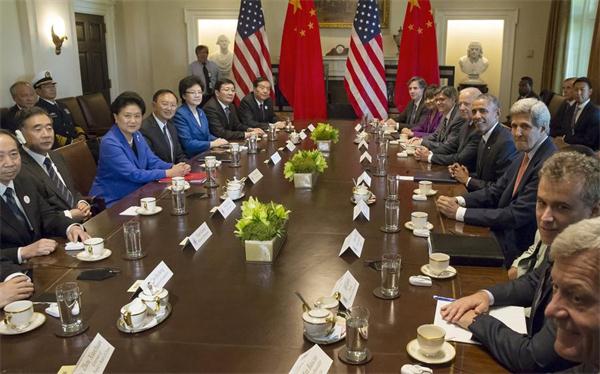A manifestation of what China really wants
Updated: 2015-06-27 10:59
By Zhu Qiwen(China Daily)
|
||||||||
 |
|
U.S. President Barack Obama (4th R) and members of his cabinet welcome Strategic and Economic Dialogue principals, including China's Vice Premier Wang Yang (2nd L, with earpiece), Vice Premier Liu Yandong (3rd L, in blue) and State Councilor Yang Jiechi (4th L) in the Cabinet Room at the White House in Washington June 24, 2015. [Photo/Agencies] |
Some Chinese policymakers who attended the 7th China-US Strategic & Economic Dialogue in Washington this week might have delivered a key message to their US counterparts by showing them photographs of blue skies in Beijing that they had saved in their smartphones.
Beijing experienced a phenomenon early this month as it welcomed crystal clear skies for many days. The phenomenon turned many Beijing residents into avid photographers who captured and shared their amazing photographs with people on their list of contacts.
And it is highly likely that some of the Chinese negotiators who traveled to Washington too did so.
By sharing the photographs with their US counterparts, the Chinese delegates are likely to have reflected China's aspirations and determination to seriously deal with its environmental issues, including polluted air, one of the top priorities on the agenda of the latest round of high-level China-US talks.
Those beautiful days, arguably the best in a decade, could be attributed to extremely favorable weather conditions. Or, perhaps they had something to do with reduced industrial production around Beijing because of the country's economic slowdown. While people remain divided on the real cause, every photograph they took speaks volumes about their love for clear skies and clean air.
More than three decades of fast economic growth has not only improved the living standards of the people, but also caused severe environmental damage that sometimes had made breathing difficult even in cities like Beijing.
How fast can China fix its environmental problems has become a big issue for many Chinese who believe that economic growth should go hand in hand with environmental protection. Therefore, cooperation between the world's two largest economies in environmental protection should be further prioritized under the S&ED mechanism.
In China, the public and government have reached an understanding on the necessity of enhanced environmental protection to shift the national economy toward sustainable growth in the coming decades.
Extensive economic growth over the past three decades has caused such environmental damage that some people have even lost faith in the country's efforts to restore its air, water and soil to its pristine past. But as the tempting blue skies breathed new enthusiasm among the people, it has become obvious that a better life cannot be realized without a clean environment no matter how much material wealth the country or individuals accumulate. To meet people's rising aspirations for a clean environment, policymakers have expedited efforts to reduce industrial pollution and increase energy efficiency.
The S&ED has become an important and effective platform for Chinese and US policymakers to focus on how the two countries can work together to reduce emissions and increase energy efficiency for mutual benefit.
China's massive production capacity and the US' superior green technologies make the two countries natural partners in developing clean energy products at affordable prices. By doing so, China can use such products to save energy and reduce pollution while related businesses from the two countries can increase their profits.
While China and the US can gain a lot by collaborating in these areas, they need to give more government support to their enterprises to tap that great potential.
The landmark agreement on climate change China and the US reached in 2014 is an opportunity the world's largest developing and largest developed economies should use to advance and consolidate their joint commitment to fight climate change.
The blue skies in Beijing may not appear so attractive to US negotiators if they are used to taking them for granted. But when they see them in person while attending the S&ED in Beijing in the future, they will know how well their work has paid off.
The author is a senior writer with China Daily. zhuqiwen@chinadaily.com.cn
- Global health entering new era: WHO chief
- Brazil's planning minister steps aside after recordings revelation
- Vietnam, US adopt joint statement on advancing comprehensive partnership
- European border closures 'inhumane': UN refugee agency
- Japan's foreign minister calls A-bombings extremely regrettable
- Fukushima impact unprecedented for oceans: US expert

 Stars of Lijiang River: Elderly brothers with white beards
Stars of Lijiang River: Elderly brothers with white beards
 Wealthy Chinese children paying money to learn British manners
Wealthy Chinese children paying money to learn British manners
 Military-style wedding: Fighter jets, grooms in dashing uniforms
Military-style wedding: Fighter jets, grooms in dashing uniforms
 Striking photos around the world: May 16 - May 22
Striking photos around the world: May 16 - May 22
 Robots help elderly in nursing home in east China
Robots help elderly in nursing home in east China
 Hanging in the air: Chongqing holds rescue drill
Hanging in the air: Chongqing holds rescue drill
 2.1-ton tofu finishes in two hours in central China
2.1-ton tofu finishes in two hours in central China
 Six things you may not know about Grain Buds
Six things you may not know about Grain Buds
Most Viewed
Editor's Picks

|

|

|

|

|

|
Today's Top News
Liang avoids jail in shooting death
China's finance minister addresses ratings downgrade
Duke alumni visit Chinese Embassy
Marriott unlikely to top Anbang offer for Starwood: Observers
Chinese biopharma debuts on Nasdaq
What ends Jeb Bush's White House hopes
Investigation for Nicolas's campaign
Will US-ASEAN meeting be good for region?
US Weekly

|

|







